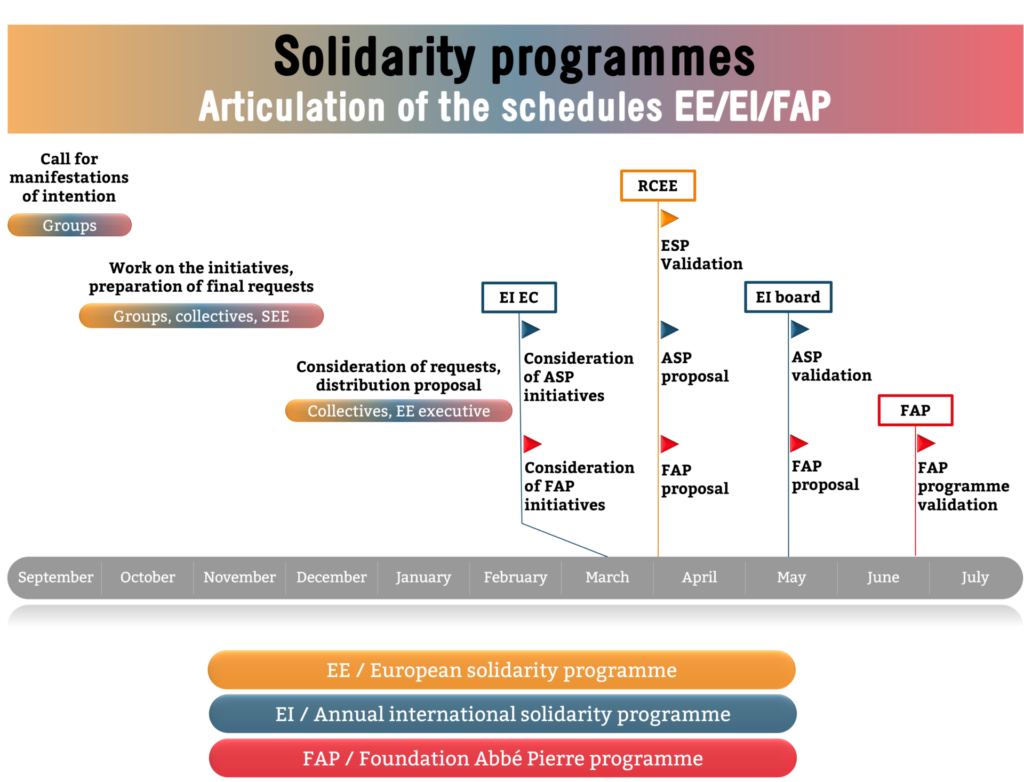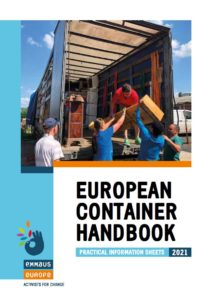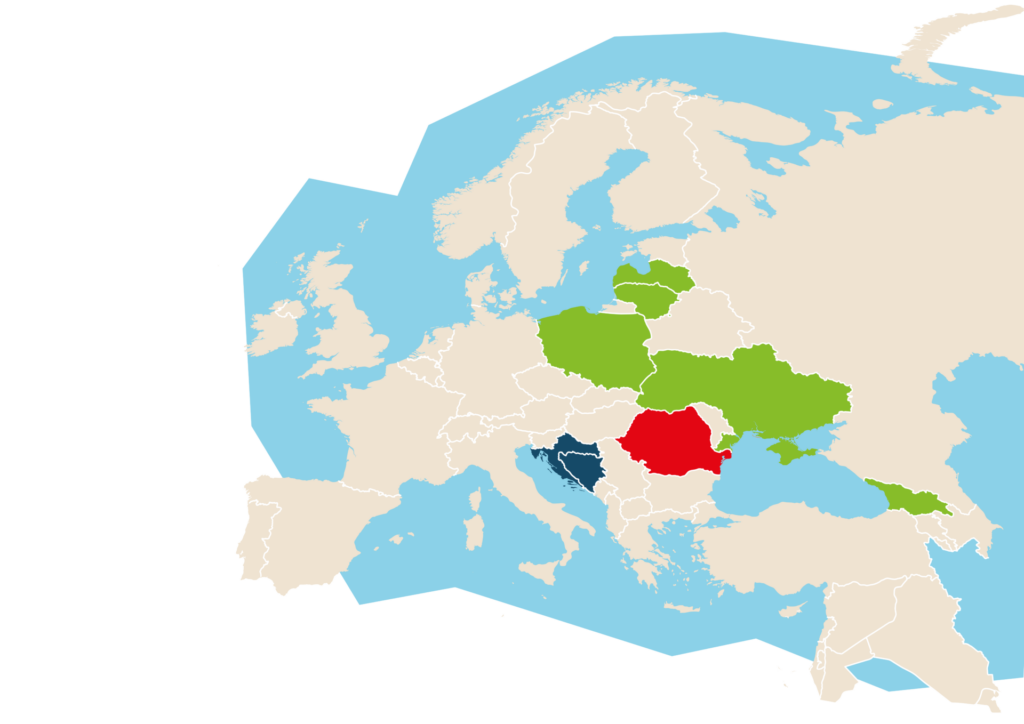Solidarity
The annual European solidarity programme enables several groups in Europe to run initiatives that further the struggles of our movement. Supporting these initiatives is only possible thanks to the support provided by other European Emmaus groups!
What is the European solidarity programme?
The programme is for initiatives that the groups would like to lead but for which they require financial support. The initiatives put forward by the groups are then analysed and approved at the meetings of the collectives and by the elected representatives of Emmaus Europe. The representatives ensure that the initiatives meet our common criteria (see how it works) and that they will help us achieve our social goals. Once the initiatives are approved the groups are then asked if they wish to provide support by sending funds across to Emmaus Europe. This voluntary funding scheme is the sole source of finance for this programme, it relies entirely on the resources and the enthusiasm of the groups – it is thanks to the daily work led by the members of our movement that this programme exists.
Solidarity is at the heart of our movement
This programme is designed to be an expression of Emmaus’ solidarity, something which is at the heart of our movement. Solidarity is one of our objectives, it is an expression of our desire to bring people closer together and to live in a more humane world as well as being a means of redistributing wealth for a fairer society. The reports of the initiatives led in recent years thanks to the programme will show you how these projects have allowed the groups to make progress in many different ways.
A programme that is open to all
All Emmaus groups can ask for solidarity support from the movement in order to implement their initiatives. The planned action must respect the principles and criteria of our solidarity programmes as designed and approved by the representatives of Emmaus Europe and Emmaus International.
The decision-making bodies involved
The initiatives that are put forward by the groups are worked on by the secretariat of Emmaus Europe, with the involvement of the European collectives whenever possible. The initiatives are then analysed and approved by the decision-making bodies of Emmaus Europe in order to finalise the programme by early spring. A call for donations is then sent out to the European groups, asking them to contribute whatever they can to the programme. These voluntary donations are the only source of funding for this solidarity programme.
Monitoring
The groups then launch their initiatives, with support from the secretariat of Emmaus Europe, and a report of the solidarity programme is drafted every year and is included in Emmaus Europe’s activity report. The document which introduces the programme (and which you can download if you wish) outlines the various principles and criteria that the initiatives must respect, it details the timeframes for sending across and approving the requests for funding and it contains guidance for the groups on how to draft their requests.

A map of the initiatives
The map below presents the various initiatives which require financial support and identifies the amounts required. You can find more information about the groups and the initiatives in the programme guide.
Making a donation
There are two different methods for sending funds across to support these groups. For both options please don’t forget to specify which initiative you would like to support and the name of your group. Thanks in advance for your contribution to our European solidarity!
Sending a cheque
You can send a cheque to Emmaus Europe at the following address:
Emmaüs Europe
47, avenue de la Résistance
93100 Montreuil
FRANCE
Bank transfer
You can also send funds to Emmaus Europe by bank transfer. Here are the account details:
Recipient: Emmaus Europe
Bank: Crédit Mutuel
IBAN: FR76 1027 8061 3700 0218 9490 174
BIC/SWIFT: CMCIFR2A
One of Emmaus Europe’s duties has always been to ensure that solidarity lives on amongst our members. Thanks to this pooling of resources many initiatives have benefitted from financial support since we started the European programme back in 2005 with the objective of serving first those who suffer most, no matter where they are.
You can look at the details of the initiatives supported each year in the annual solidarity reports, listed below. Since 2019 this information is also included in our activity reports.
What is the pooling programme all about?
The European transport programme involves sending merchandise (furniture, objects, clothes, etc.) by lorry between Emmaus groups in various European countries. This programme allows us to “redistribute wealth”, in this case our donated items, amongst our groups. The groups face very different local social and economic situations and it is much more difficult for some of them to have access to donations than it is for others. The programme also enables us to be involved in solidarity on a more European level, in parallel with our local solidarity initiatives, meaning the groups can provide support to the most excluded all across Europe.
Strengthening the ties between the groups
As well as providing equipment and objects, this transport programme creates several opportunities for exchanges and for meeting people from different Emmaus groups based elsewhere in Europe. The programme has led to the creation of several partnerships where the groups work together to identify the content that the receiver group needs and to organise the journey itself.
Working together to organise the transport programme
The European transport programme is often discussed at meetings of the collectives and has its own annual calendar. The secretariat of Emmaus Europe helps the stakeholders of the programme to create this calendar. Please refer to the transport guide if you would like more information on the programme and how you can get involved.
The donation pooling programme is the European equivalent of Emmaus International’s container programme. If you would like to share some of the merchandise you have collected with groups across the globe then take a look at Emmaus International’s website or get in touch with the international secretariat.
The calendar for the programme is drafted based on the groups’ estimates for the year ahead and is updated every time a lorry is sent. The calendar highlights the needs expressed by the receiver groups and the number of lorries set to be sent or that have already been sent by the sender groups.
You can also take a look at this table. Please inform the secretariat of Emmaus Europe if you have any changes or updates to be made to the table.
The European container handbook was drafted based on the contributions of various European groups involved in the programme. It outlines why the groups joined up and what they get from the programme. It also looks at how the programme is structured, the different stages involved in sending a lorry of donated objects/materials and it provides various pieces of advice and examples of best practices for the sending of transports.

What are the geographical collectives all about?
The European collectives are groups of members of Emmaus who meet up to debate about various topics and to work as a team. The collectives were initially created in order to organise solidarity initiatives to support the new groups that were being launched at the time in eastern Europe. They have since become more generic structures where Emmaus groups and their members meet to discuss the evolution of the movement in their countries and to debate about current hot topics for Emmaus in Europe.
Which countries are involved?
There are currently three collectives within Emmaus Europe, they cover the countries identified in the map below:
- The Poland-Ukraine collective
- The south-east Europe collective
- The Romania collective
You can find the dates and locations for the upcoming meetings of the collectives in our calendar of meetings and training sessions. The reports of these meetings are also provided on the web page for each of the collectives. The meetings of the collectives are open to all interested European Emmaus groups.

The South-East Europe Collective
The south-east Europe collective, formerly known as the Bosnia collective, unites the Emmaus groups from Bosnia-Herzegovina and Croatia. All other European groups who are interested in the development of the movement in this region are also invited to these meetings. This collective works alongside other groups in the region and is open to working with any new groups that may be launched in the future in south-east Europe.
This collective was initially created to support the International Forum of Solidarity (IFS) group. Once IFS-Emmaus had become well established throughout Bosnia-Herzegovina the collective started to help other groups in the region who wished to join Emmaus, notably Nova Generacija (Bosnia-Herzegovina), the Centre for Missing and Exploited Children (CNZD, Croatia) and the Group for the Physically Disabled (TOMS, Croatia). These new groups have very innovative models and they focus on very specific topics such as providing support to children and to persons with disabilities.
The south-east Europe collective outlined three priorities for its work:
- Organising solidarity and facilitating access to resources, in particular for new groups
- Improving our internal and external communication in order to better showcase the initiatives led by the groups
- Having a greater political impact
Reports of the Meetings
You can find reports of the meetings of the south-east Europe collective below. If you would like more information about a past or future meeting then please get in touch with the secretariat of Emmaus Europe.
Related document
The Poland-Ukraine Collective
The Poland-Ukraine collective covers the Emmaus groups from Georgia, Latvia, Lithuania, Poland and Ukraine. All other European groups who are interested in the development of the movement in this region are also invited to these meetings.
This collective was initially created to provide support to new groups being created in Poland and Ukraine. Several groups, from various European countries, showed great commitment to helping these new groups. More recently the collective has allowed Emmaus to establish a presence in Georgia, Latvia and Lithuania and has helped further groups to be launched in Poland and Ukraine. The collective plays an important role in helping to structure the new groups being created in the region.
Reports of the Meetings
You can find reports of the meetings of the Poland-Ukraine collective below. If you would like more information about a past or future meeting then please get in touch with the secretariat of Emmaus Europe.
Related document
The Romania Collective
The Romania collective unites the Emmaus groups from Romania and all other European groups who are interested in the development of the movement in this country are also invited to these meetings. The collective provides support to those who wish to launch new Emmaus groups in Romania.
This collective was initially created to organise the solidarity initiatives led amongst the three Romanian groups and with other European Emmaus groups (notably in France, Switzerland and the UK) who had strong ties to Emmaus in Romania. The collective has now become the main opportunity for the Romanian groups to meet and hold debates. Recently the collective supported the creation of a national organisation for Emmaus in Romania as well as discussing how to provide greater visibility to Emmaus’ struggles in the country.
Reports of the Meetings
You can find reports of the meetings of the Romania collective below. If you would like more information about a past or future meeting then please get in touch with the secretariat of Emmaus Europe.



